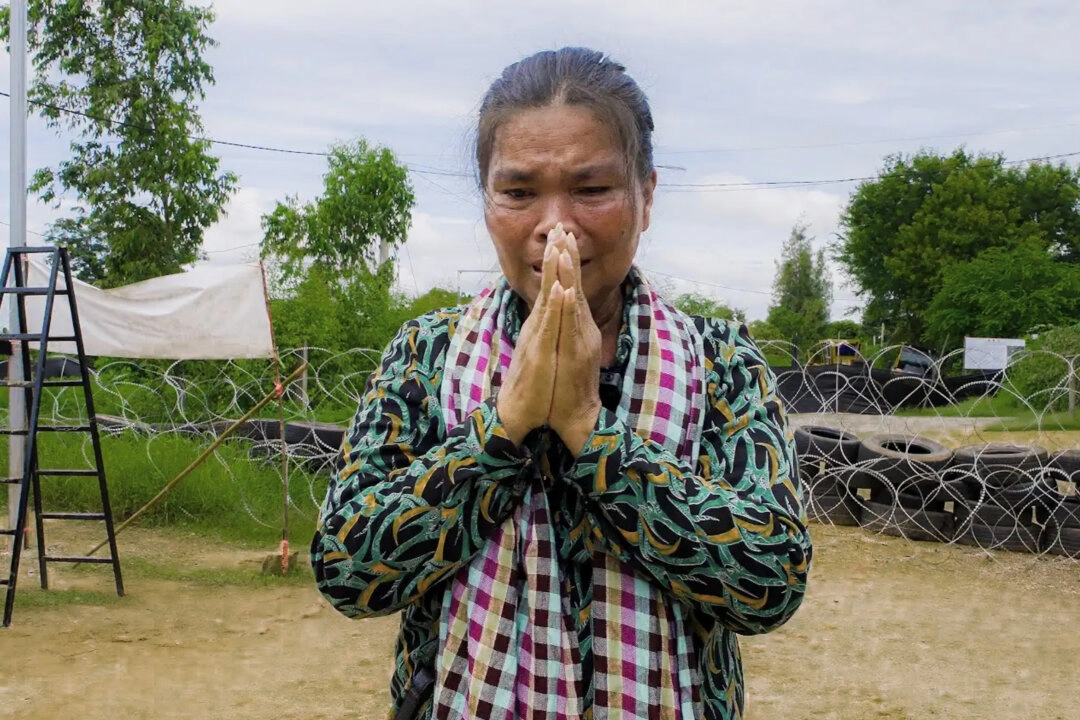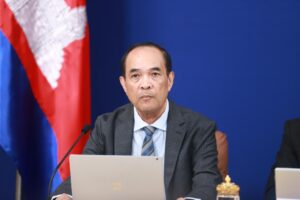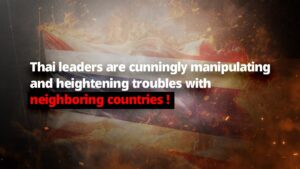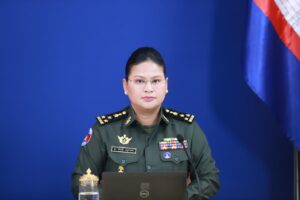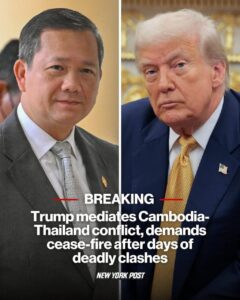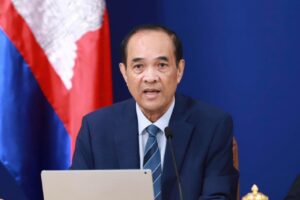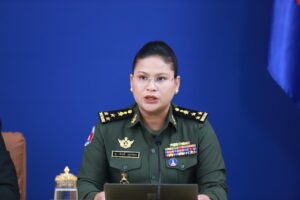Caught on Cambodia’s Front Line
The true cost and real casualties of Thailand and Cambodia’s border conflict up close.
Hul Mliss stands in front of her home in Prey chan village, Cambodia, as the road to her farmland is filled with compacted sand behind the barbed wire fence newly-installed by the Thai military on the border between Thailand and Cambodia on Sept. 28. Thai army and news report that the villagers have until Oct. 10 to evacuate the village or they will be arrested. Sangly Sarak
As Cambodia and Thailand traded jabs at the U.N. General Assembly in New York this week, I was on the border of the land that lies between the two countries.
A barbed wire fence now cuts across Prey Chan Village, sealing off Cambodian homes and farmland behind boundaries unilaterally imposed by the Thai military.
Behind it lie the houses of six villagers who right now can’t return home. One grandmother wept as she watched the road to what used to be her farmland being laid with compacted sand by Thai construction workers.
“Every day I look at my home and wonder if we will ever step inside again,” Hul Mliss said. “Every day it feels like there is less and less chance of that happening.”
Meanwhile, her 3-year-old granddaughter played in the monsoon-beaten mud-plains by the open-air hammocks on which her family sleeps at night, yards from their barricaded home. The house’s blue rooftop jutted out of the foliage in the glaring mid-afternoon sun, trapped behind newly demarcated boundaries set up by the Thai military weeks ago.
The Thai–Cambodia conflict has received little global media attention, but the human ramifications run deep. I am one of the only foreign journalists to have visited the affected areas in Cambodia, since most news organizations are in Bangkok and the borders are shut.
On July 24, escalating tensions between Thailand and Cambodia erupted into violent clashes near the Prasat Tamone Thom temple, with both sides accusing each other of initiating hostilities.
Thai forces reported Cambodian armed soldiers near their border, while Cambodia claimed Thailand launched an unprovoked assault and sealed off access to the temple.
Intense fighting involved artillery, BM-21 rocket attacks, and Thai F-16 airstrikes, resulting in significant casualties, including civilian deaths in Thailand’s Sisaket province and damage to Cambodian pagoda, school, health center, and private properties in Oddor Meach Chey and Preah Vihear provinces.
The clashes continued along Cambodian–Thai borders in Preah Vihear and Oddor Meanchey provinces, with Cambodia alleging Thai use of cluster munitions and Thailand accusing Cambodia of war crimes for targeting civilians and cultural sites. The conflict expanded until July 28, when a cease-fire was reached at midnight after U.S. President Donald Trump threatened to impose tariffs on both nations if the fighting didn’t stop. Since then, both sides have claimed breaches of the cease-fire.
In spite of the two separate political narratives, what is not up for debate is that throngs of poor villagers have paid the price and that many children have been left orphaned by the crisis. Most of them are to be found on the Cambodian side of the border, where the economy is poorer and electricity and clean water are scarcer than in neighboring Thailand.
“Before the fighting, we used to go to Thailand the whole time. We are like good neighbors. But after the clash between Cambodia and Thailand at the temple, the Thai army came and evacuated us from our homes. We had 20 minutes to gather our things and leave. It broke our spirits and our hearts,” Mliss said.
Another displaced villager, Hak Pov, who lost his leg in a landmine accident, is also homeless.
His family lives in neighboring Chork Chey Village, which the Thai army has threatened to claim as its own any day. If and when it does, any remaining villagers like Mliss and Pov and their families face a fine of around 3000 euros and years behind bars for illegally entering Thai territory.
Mliss took a bank loan against her farm, which has now gone delinquent since there is no land to secure it, and she doesn’t have an income now to repay it. While her bank has temporarily forgiven the repayments, the interest ratchets up on the loan even today, she said.
Even before the most recent conflict erupted, these villagers were disadvantaged. Pov has intimate experience with the territory. His right leg was shredded by a landmine on his former farmland as he attempted to voluntarily remove it. He climbed to safety by dragging himself to the nearest village, where his limb was amputated just in time to save his life. That was two decades ago.
Since then, he’s voluntarily gone back to remove other land mines, contributing to the safety of the area overall.
Claims by the Thai side that their army was blown up by landmines make no sense, he said.
“If they walked on landmines, that’s because it’s Cambodian land. All the land mines are buried deep in the shrubs of Cambodia: that’s where they were laid—not in Thailand!” he said.
Further along the border in Wat Po, where the fighting broke out, there are more heartbreaking stories being told. Around 200 children are orphaned, with barely enough literate adults to care for them. I met one of the orphans, a 10-year-old girl called Raem Reaksmey. She told me that when the fighting broke out in July, her father was working as a farmer on the Thai side of the border, where he remains to this day. Shortly after they were separated, her mother, left alone to care for her only daughter, had a nervous breakdown and fled, leaving Reaksmey orphaned.
Her father’s last words to her were: “Ream, you will have to survive on your own now,” before she was whisked off to the makeshift refugee camp she now sits in.
Reaksmey’s story is a curious one: She claims that she was separated from her father after the Thai army fired white phosphorus rounds into the air, which, when they landed, contaminated her village. Though anecdotal, this account is itself noteworthy, for initially, the Thais claimed that they hadn’t used the chemical, only to admit later that they had done so for the purposes of illumination. White phosphorus is a chemical weapon that’s used in warfare to melt objects like tanks or to light up the sky. To use it on civilian areas is a war crime; to use it as a beacon or for military purposes is not. Either way, her former home is now covered in the chemical, she said, forcing her to leave it behind.
At one point, Reaksmey lay her head on my chest and openly sobbed.
“I’m sorry, I’m so, so scared,” she told me.
I said what I could to assure her that everything would turn out OK and that this would all be temporary. In truth, I don’t know if that’s the case.
For if a diplomatic solution isn’t found soon, then there will be thousands more casualties like Mliss, Pov, and Reaksmey.
Thailand has accused Cambodia of not evacuating its villagers from dangerous areas, even as the Thai authorities claim to have done so for thousands of their own citizens. Sangly Sarak, a prominent newscaster in Cambodia who visited the border with me, explains that the comparison is not apt.
“You can’t compare what Thailand and Cambodia are doing domestically because it’s not Thai territory that’s at stake,” he said.
Sarak was brought up by farmers. A farmer’s mentality is that their land is their life, he said.
“If your land is under threat of being taken away from you, you are not going to leave. You are going to stay and protect your territory. The mindset is, ‘We will protect our homes, our people. We cannot leave. This is our home. This is our land. You can’t just say that this is yours now,’” said Sarak.
As with all military conflicts, there are those who are unintended casualties, too, with only the remotest connections to the events. Last month, hours after the cease-fire began, 18 Cambodian soldiers were caught, placed in neck braces, and ferried off to Thai jails, where they sit now.
I met the mother and sister of one of these soldiers, Sgt. Maj. Phem Chanthea. They are rural farmers who have no electricity, internet, or TV since they live in a remote border province called Oddar Meanchey. They heard about the capture of their son and brother via word-of-mouth that traveled up the border. They described Chanthea as a fun-loving, funny boy who would always make them laugh. As a result of his capture, they have no income except for the small stipend they receive from the army in his absence. More than anything else, his mother fears for his return.
“I am really scared I will never get to see my son again,” she said.
I asked if she had a message for him.
“If he can hear my message, then I want to tell him to be strong. We are doing well—don’t worry about us. Just keep yourself well while you are gone,” she said. “I don’t have any more words left.”
When I spoke with U.S. Rep. Richard McCormick (R-Ga.) just before my journey out to Cambodia, he assured me that the 18 imprisoned soldiers would be returning home “soon.” Other Washington insiders have suggested to me that solutions including reparations paid by Thailand to the evicted Cambodians present further potential negotiation points for talks “behind closed doors.”
The fate of the Cambodian soldiers who are behind bars in Thailand weighed on locals as far away from the border areas as Phnom Penh, Cambodia’s capital.
“I want to ask the international community if they can at least intervene to return those soldiers home,” one Cambodian high-school student, 14, who goes to a prestigious international school in Phnom Penh, told me. His younger brother, 11, said he’s “scared,” while his sister, 13, said she was “confused” by the events.
These are the sentiments that sum up what most Cambodians feel right now, and they are reflected in the economic repercussions for both nations. If left unchecked, they may impact more nations, too, over time.
Thailand faces billions of baht in losses from disrupted border trade, a 90 percent tourism drop in hotspot areas like Koh Chang, and labor shortages due to the exodus of Cambodian migrant workers.
Cambodia is grappling with a projected GDP decline of more than 3 percent, a sharp fall in tourism revenue to its famed city Angkor Wat, and economic strain from workers returning from Thailand, impacting remittances back into the country.
The conflict has displaced a total of nearly 200,000 people in Cambodian border areas, disrupting agriculture and increasing loan defaults like Mliss’s bank loan. The crisis has undermined investor confidence, delayed infrastructure projects, and threatens ASEAN economic integration while potentially diverting funds to defense spending.
The massive Japanese-built highway that connects the north of Cambodia to Phnom Penh is mostly empty because of the border closure.
Poi Pet, a northern Cambodian town, usually bustles with Thai visitors attracted to its vibrant entertainment. Today it feels like a ghost town. Hotels are empty aside from a smattering of Chinese tourists. Cambodia and Thailand have discouraged trade boycotts so far, but unless the conflict is resolved soon, these, too, loom.
This significant backlash may soon spill over the borders of Thailand and Cambodia into global supply chains and economies overall.
But media coverage and political action so far, aside from Trump’s brokering of the summer cease-fire agreement, remain muted. More than anything, this is what is so frustrating, said Sarak.
Further, of all the conflicts worldwide for which the U.S. president says he has brokered peace deals, this one seems to present the greatest test to his ability to resolve. Many Cambodians feel he is the only one who can implement a lasting solution.
“If we can just make everyone understand that Cambodia wants peace, Cambodia wants the borders open again, and if the international community can support these efforts, then I believe that this is a good start,” said Sarak.
“This is a crisis right now, but it could become an opportunity to resolve the matter once and for all through the international courts. That’s the Cambodian wish.
“Thais are our brothers. We want to share the world with them again, not fight to defend it this way. That’s not good for anybody at all.”
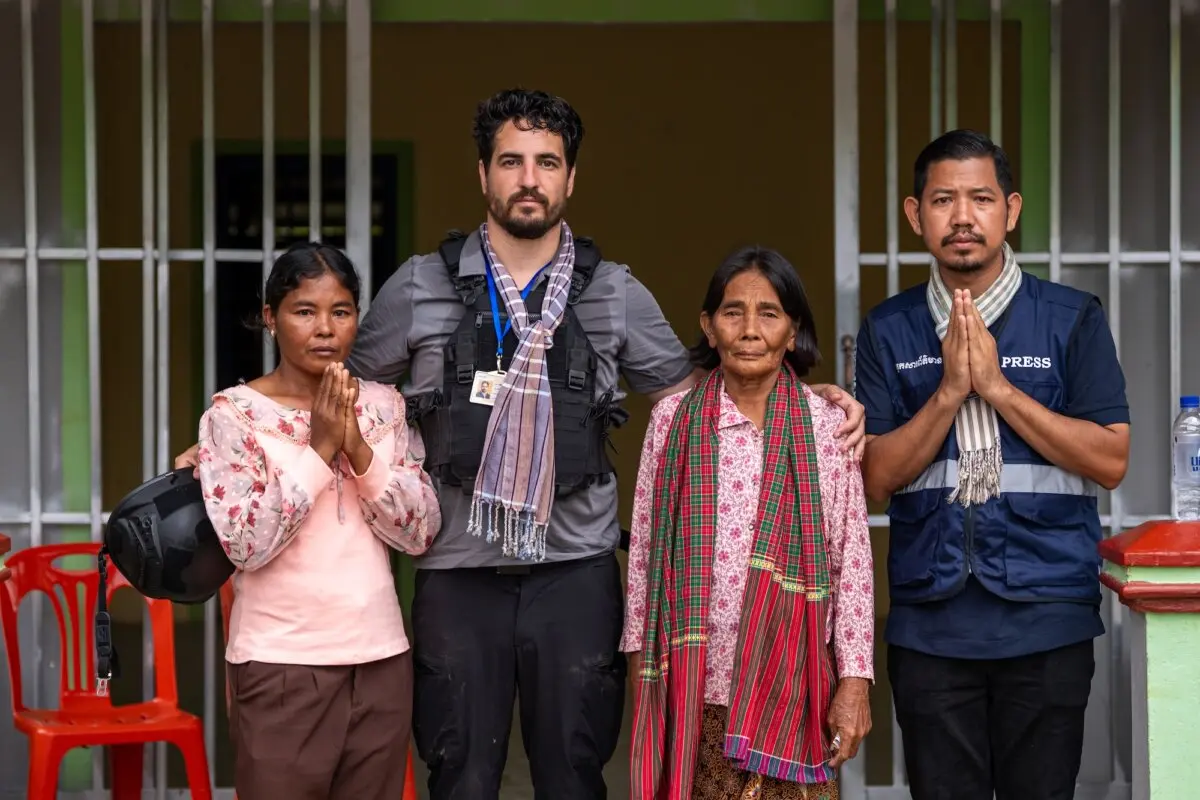
Source: The Epoch Times

